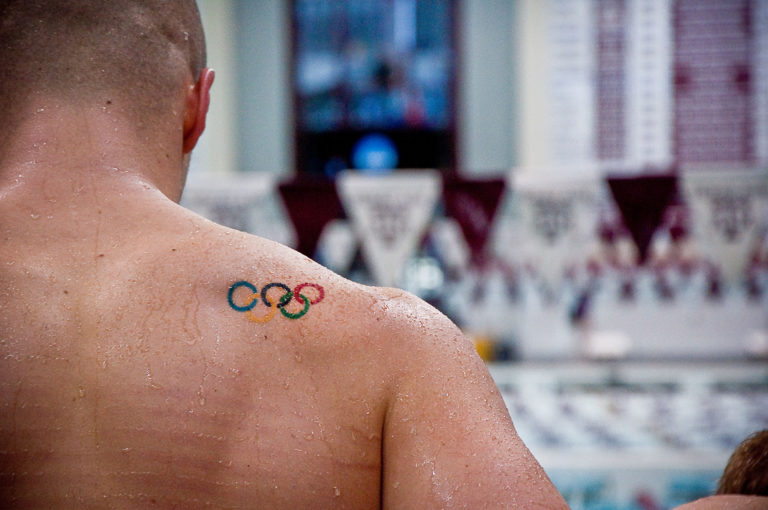
Image by Josh McKenna.
The Moral Value of Sports
It’s Sunday morning. The children are getting dressed in clothes laid aside for this day. Mom and Dad load the kids in the car and drive away from their comfortable suburban home. This is a typical (albeit not universal) scene throughout the country. What’s becoming even more typical is that this family is on their way to a soccer game — not to Sunday School and church.
More and more, it seems, parents are encouraging their children to participate in organized sports, even when practice and game times conflict with religious services. Those of us concerned about over-programming our young people widely regard Sunday sports as further erosion of the sabbath rhythms that keep us sane and healthy, individually and as a society. And we might well be right.
Yet, could it be that organized sports are meeting some deeper need that is not being met by contemporary religious communities? Is it possible that parents rely more on sports than on faith traditions to form their children morally? What is the moral value of sports? And what can the church learn by paying attention to the lessons of athletic competition?
Sport as Metaphor for the Life of Faith
Scriptures throughout the ages have drawn connections between athletic competition and the life of faith. During the 1996 Olympic Games, as athletes staggered in Atlanta’s sweltering heat, we saw televised images that daily echoed these familiar words from Isaiah 40:
Even youths will faint and be weary, and the young will fall exhausted;
but those who wait upon the Lord shall renew their strength,
they shall mount up with wings like eagles,
they shall run and not be weary,
they shall walk and not faint.
Olympic athletes reminded us of the second letter to Timothy (4:7-8), when early Christians were challenged to “fight the good fight, finish the race, and keep the faith” so that we may attain “the crown of righteousness” which has been reserved for us.
The Olympic Games have long shaped public imagination — modern historians trace the Games to at least 776 B.C.E. — so it is no wonder that biblical authors referred to sports when describing the life of faith. Sports analogies are convenient currency for illustrating virtues such as courage and perseverance, or vices such as cowardice and cheating. We recognize the endurance a marathon runner must have simply to finish the race. How similar is the endurance needed to be faithful over the long haul, to remain steadfast day after day — particularly on days when life seems more like a treadmill than a pilgrimage.

Sport as Social Practice
To view sports simply as metaphor for some deeper spiritual truth, however, is to overlook the way a sport itself forms people morally. Jeffery Stout, building on the work of moral philosopher Alasdair MacIntyre, portrays sports as complex social practices that shape our moral vision and character. In his book Ethics After Babel, Stout contends with cultural critics who claim that the American moral landscape is hopelessly fragmented. Instead, argues Stout, we can discover the moral language of America by observing how parents devote long hours and go to great expense to conscript young people into social practices such as chess, ballet, piano lessons, tennis, and baseball.
We train our children in multiple practices because we trust that each practice will form their character in particular ways. In general, one may experience the thrill of victory or the agony of defeat on the floor of the New York Stock Exchange as well as on the golf course. In particular, one can only experience the thrill of a hole-in-one or the agony of a missed putt on the golf course, a stylized moral landscape of rough and smooth terrain.
A word of clarification is in order about the term “social practice.” We commonly use the word “practice” in its verbal form to mean the repeated performance of an activity in order to achieve proficiency. We say, “practice makes perfect” to a basketball player who rehearses lay-ups and foul shots in order to play better in the actual game. In this sense, practice is utilitarian: it is the necessary repetition required of those who wish to perform a particular activity.
There are situations, though, when our use of the word “practice” extends beyond technical rationality and points toward a way of life. When we speak of “legal practice” or “medical practice,” we refer to more than the rehearsal of specific skills or techniques. No one would want to go under the knife of a surgeon who is “just practicing” a set of skills. The term “medical practice” encompasses skills, to be sure, but also means a regulated, social form of human activity that includes an ongoing tradition and designated practitioners. A medical professional is held accountable to various legal and ethical standards and codes of behavior — ancient and modern — which shape contemporary medical care as an ongoing practice. Medical schools go to great effort and expense to induct students into this way of life.
To view a sport as a social practice is to make similar claims about participants in this form of human activity. Ken Burns’s made-for-PBS Baseball epic portrays the sport as a social practice that has profoundly shaped and mirrored our national character. Just as the Civil War was a defining historical event, the ongoing practice of baseball continues to show us who we are and what we value as North Americans. For example, our reactions to the 1995 players’ strike reveal more about national character than a dozen public opinion polls. At stake in this dispute was the integrity of the game of baseball; the professional game, it seemed, was being corrupted by the very institution that claimed to sustain it. As Stout observes, “external goods” such as power, prestige, and money always threaten the “goods” internal to a social practice.

Goods Internal and External to Sports
When participation in a sport is primarily motivated by political, economic, or religious interest — including personal desire to win a gold medal for a deceased friend or family member — the integrity of the sport is compromised and the stage is set for the athlete’s profound sense of personal failure. We recall the Olympic anguish of speed skater Dan Jansen and gymnast Vitaly Scherbo, encouraged by the sensationalist media to win a gold medal for the sake of honoring family members. In winning only a bronze medal in Atlanta, a thoroughly dejected Scherbo lamented that he had failed his wife, who was at the time recuperating from a near-fatal automobile accident. Scherbo expressed that he felt no satisfaction in his gymnastic accomplishments.
The 1981 movie Chariots of Fire illustrates well the reality of mixed motivations in athletic competition. The two “outstanding” characters in this film are Eric Liddell, a Scottish missionary, and Harold Abrahams, a Jewish Cambridge student. Both men are sprinters for the British team in the 1924 Paris Olympics. Both men are driven to run by different motives. Liddell views his God-given speed as an offering and a commandment: “When I run, I feel His pleasure.” Abrahams presses toward the goal of being the fastest human on earth, trusting that his victory will bring dignity to all Jewish people.
Because they are driven rather than drawn to run, both Liddell and Abrahams are respectively stymied. Liddell is convinced he is running for God, yet his strict Sabbatarian principles prevent him from running a Sunday race. Abrahams is willing to breach training protocol to win, yet he despairs when contemplating the achievement of his ambition: winning the 100-meter dash. For both runners, religious and political motivations threaten to overwhelm their athletic motivation for the sport of running. It is flawed interpretation to suggest that Liddell’s personal religious motive for running is somehow superior to Abrahams’ personal political motive.
Enter Lord Andrew Lindsay, an aristocratic Cambridge student who runs simply for the delight of the sport. When Abrahams brashly announces he alone will break the school record for running around the courtyard, a bathrobed Lindsay appears on the scene with a cigarette holder and bottle of champagne to make the race a friendly competition. Later, at his country estate, Lord Lindsay playfully jumps hurdles topped with champagne glasses. He jostles a hurdle and the champagne sloshes out of the glass, yet this lack of perfection doesn’t diminish Lindsay’s enthusiasm and delight for running.
Indeed, it is Lord Lindsay’s non-possessive delight in the sport that enables him to make the critical sacrifice in this story. Lindsay respects Liddell’s sabbath convictions and volunteers to let his teammate run a race in his stead on another day. When Liddell and Abrahams win their respective races, Lindsay is as happy as if he himself had run and won. Such is the moral character of an athlete who refuses to conflate the goals of athletic competition with the goals of religion and politics.

Embodied Stories
Sports are social practices that form us morally. Sports are as salient for character formation as the stories William Bennett commends in his popular Book of Virtues. Bennett is correct that good stories have the potential to transform the imagination. Stories can best teach us about virtues and vices, however, as we encounter these stories embodied in the concrete practices of a local community. Indeed, apart from communities of interpretation, care, and accountability, a “book of virtues” remains an abstract ideal, a compendium of cultural (and perhaps ideological) desiderata.
Children and adults alike experience the cardinal virtues and vices firsthand on the Little League baseball field. We may initially speak in terms of “hogging the ball” and “chickening out” instead of “avarice” and “cowardice.” Yet over time, as Jeffery Stout observes, these rudimentary expressions form the basis of a nuanced moral vocabulary that will transfer to other practices later in life:
“The more we learn about the social practices around us (whether by participation, observation, or hearsay), the more variegated our conception of human excellence and our vocabulary of appraisal can become. … A young doctor summoning up courage for the first time in the pursuit of goods internal to medicine doesn’t start from scratch. Experience in other practices where other kinds of courage are required should make the going easier.”
Adults who care about the moral formation of their children are eager for the dependable lessons children can learn from participating in sports. This is basically a pragmatic approach — à la John Dewey — that views life experience as our primary teacher. Religious communities can create a safe space for reflecting on that life experience, especially the personal sports stories of children and their parents. Religious educators can prompt lively discussion by asking questions about their embodied stories: How does the rule-bound, disciplined world of sports enable/inhibit human freedom? What is it about the nature of sports that promotes racial and ethnic diversity? In what ways do our teenage daughters (and sons) build self-esteem through healthy athletic competition? What happens when athletes cheat to win, and how do we respond to situations in which the coach urges players to gain unfair advantage?

Lessons for the Church
Discerning the moral value of sports is a good place for church educators to begin. Christian congregations can also reconceive their educational strategies by identifying ecclesial activities that have a “practice-like” quality. We are not born knowing how to pray or read the Bible or extend hospitality to strangers. These are historic practices of the church that have a long history and tradition. We need to become as intentional about teaching children the practice of prayer as we are about teaching them how to play the piano. People don’t just pick up a practice without some intentional, sequential, structured learning.
After identifying the fundamental activities that animate Christian faith, congregations can conduct a local “practice inventory.” It is difficult to teach something that we ourselves do not practice well. Providentially, we are not alone in our educational efforts. The church is a global, trans-historical reality. With our children, we can learn from those who have come before us and with those who are more proficient in some of these practices. And even though we maintain that faith is a gift from God — not our doing — we will find our faith deepened and enriched as we embrace the way of life into which these practices invite us.
Families may still drive past our churches on Sunday mornings on their way to soccer games. People of faith may still share concern over the need for sabbath observance. Churchgoers, however, need to appreciate how athletic teams bear a family resemblance to congregations: both function as much-needed mediating institutions between public and private life in our complex society. Christians are called to support voluntary associations that contribute to healthy public life. In this spirit, Christians can affirm the moral value of sports while emphasizing that their congregations, too, can initiate young people into a set of life-giving practices… practices that will form their moral character as deeply as — and ultimately deeper than — sports.
This essay was originally published in The Cresset, Vol. 61, No.3, Lent 1998, pp. 6-11 and is reprinted with permission of the author.

